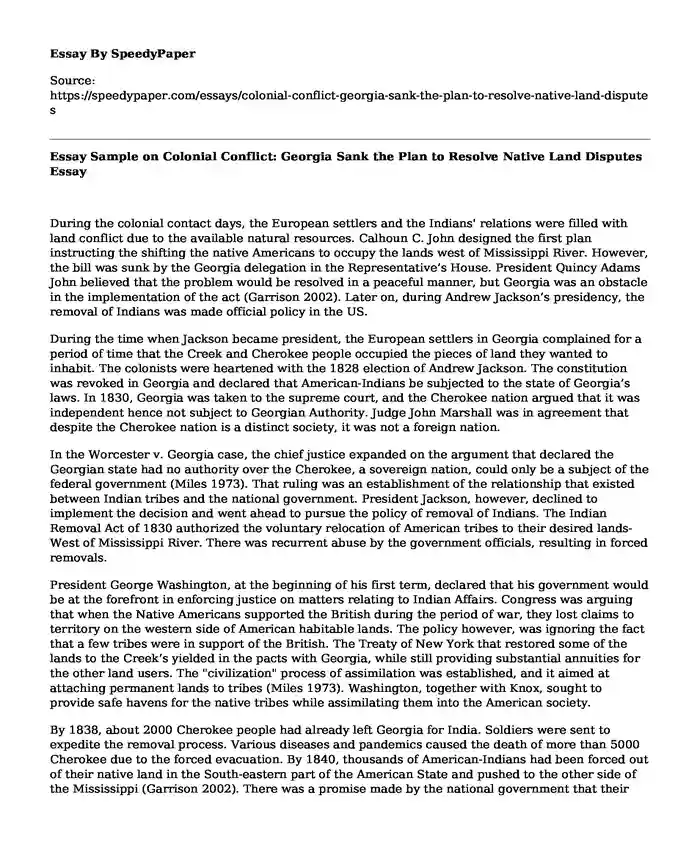
| Type of paper: | Essay |
| Categories: | History Political science |
| Pages: | 3 |
| Wordcount: | 610 words |
During the colonial contact days, the European settlers and the Indians' relations were filled with land conflict due to the available natural resources. Calhoun C. John designed the first plan instructing the shifting the native Americans to occupy the lands west of Mississippi River. However, the bill was sunk by the Georgia delegation in the Representative’s House. President Quincy Adams John believed that the problem would be resolved in a peaceful manner, but Georgia was an obstacle in the implementation of the act (Garrison 2002). Later on, during Andrew Jackson’s presidency, the removal of Indians was made official policy in the US.
During the time when Jackson became president, the European settlers in Georgia complained for a period of time that the Creek and Cherokee people occupied the pieces of land they wanted to inhabit. The colonists were heartened with the 1828 election of Andrew Jackson. The constitution was revoked in Georgia and declared that American-Indians be subjected to the state of Georgia’s laws. In 1830, Georgia was taken to the supreme court, and the Cherokee nation argued that it was independent hence not subject to Georgian Authority. Judge John Marshall was in agreement that despite the Cherokee nation is a distinct society, it was not a foreign nation.
In the Worcester v. Georgia case, the chief justice expanded on the argument that declared the Georgian state had no authority over the Cherokee, a sovereign nation, could only be a subject of the federal government (Miles 1973). That ruling was an establishment of the relationship that existed between Indian tribes and the national government. President Jackson, however, declined to implement the decision and went ahead to pursue the policy of removal of Indians. The Indian Removal Act of 1830 authorized the voluntary relocation of American tribes to their desired lands-West of Mississippi River. There was recurrent abuse by the government officials, resulting in forced removals.
President George Washington, at the beginning of his first term, declared that his government would be at the forefront in enforcing justice on matters relating to Indian Affairs. Congress was arguing that when the Native Americans supported the British during the period of war, they lost claims to territory on the western side of American habitable lands. The policy however, was ignoring the fact that a few tribes were in support of the British. The Treaty of New York that restored some of the lands to the Creek’s yielded in the pacts with Georgia, while still providing substantial annuities for the other land users. The "civilization" process of assimilation was established, and it aimed at attaching permanent lands to tribes (Miles 1973). Washington, together with Knox, sought to provide safe havens for the native tribes while assimilating them into the American society.
By 1838, about 2000 Cherokee people had already left Georgia for India. Soldiers were sent to expedite the removal process. Various diseases and pandemics caused the death of more than 5000 Cherokee due to the forced evacuation. By 1840, thousands of American-Indians had been forced out of their native land in the South-eastern part of the American State and pushed to the other side of the Mississippi (Garrison 2002). There was a promise made by the national government that their land would remain unmolested. However, the white settlers were pushing westwards (Indian country), and it continued shrinking. Later on, the territory came to be named Oklahoma.
Works Cited
Garrison, Tim Alan. The legal ideology of removal: the southern judiciary and the sovereignty of Native American nations. University of Georgia Press, 2002.
Miles, Edwin A. "After John Marshall's Decision: Worcester v. Georgia and the Nullification Crisis." The Journal of Southern History 39.4 (1973): 519-544.
Cite this page
Essay Sample on Colonial Conflict: Georgia Sank the Plan to Resolve Native Land Disputes. (2023, Aug 14). Retrieved from https://speedypaper.net/essays/colonial-conflict-georgia-sank-the-plan-to-resolve-native-land-disputes
Request Removal
If you are the original author of this essay and no longer wish to have it published on the SpeedyPaper website, please click below to request its removal:
- Child Development Theory. Free Essay in Psychology.
- Essay Sample on Preventing Adverse Drug Reactions
- Statistics Paper Example with Questions on T-Test
- Paper Example on President Lincoln's War Aim
- Free Essay. Introduction to Victimology
- Plague of Athens: Impact on Peloponnesian War (430-426 BCE) - Paper Example
- Essay Sample on Social Class and Political Power
Popular categories




